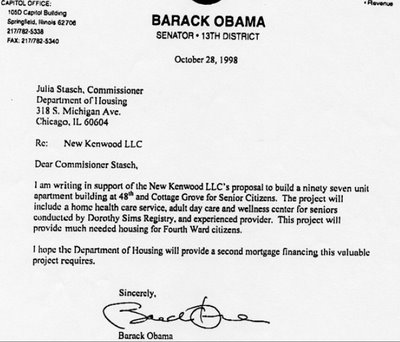Beauty Turner is a long time public housing activist in the South Side of Chicago in the district where Barack Obama served as Illinois state senator. She is also a free lance writer, covering issues of concern to residents of the district. Respected in her community, she will be a featured commentator for WPHK in Chicago on election night. As a resident of public housing in the area where Obama cut his political teeth, she has been a long time observer of the Democrat candidate. She is the host of Beauty’s Ghetto Bus Tours, where visitors to Chicago can see the projects first hand. Despite being an anti-war activist and having liberal leanings, she is quite critical of Barack Obama.
I found Ms. Turner online blog while doing research on Barack Obama record on housing while he was a state senator from 1996-2004. In this post, I summarize a brief conversation with her about Obama’s record while an Illinois state senator. Given Obama’s constant promise of change, I wanted to see what kind of change he brought to the streets of Chicago’s South side. What I found was dramatically disappointing.
First some background. Some of the worst episodes in a rather bleak recent history of public housing in Chicago took place during Senator Obama’s watch. For instance, on one occasion during a five week period during the frigid Chicago winter of 1996-1997, a building in his district went without heat. Here is how the Chicago Sun-Times described the situation:
For more than five weeks during the brutal winter of 1997, tenants shivered without heat in a government-subsidized apartment building on Chicago’s South Side.
It was just four years after the landlords — Antoin “Tony” Rezko and his partner Daniel Mahru — had rehabbed the 31-unit building in Englewood with a loan from Chicago taxpayers.
Rezko and Mahru couldn’t find money to get the heat back on.
But their company, Rezmar Corp., did come up with $1,000 to give to the political campaign fund of Barack Obama, the newly elected state senator whose district included the unheated building.
Obama has been friends with Rezko for 17 years. Rezko has been a political patron to Obama and many others, helping to raise millions of dollars for them through his own contributions and by hosting fund-raisers in his home.
The same Sun-Time article adds,
The tenants there had no heat from Dec. 27, 1996, until at least Feb. 3, 1997, when the city of Chicago sued to turn the heat on. The case was settled later that month with a $100 fine.
It was during that time that the area’s new state senator, Barack Obama, got a $1,000 campaign donation from Rezmar. The date: Jan. 14, 1997.
When asked about the incident, Senator Obama said he “never had a conversation with Mr. Rezko about the matter.” The Boston Globe later probed for more about these events, but the Obama campaign did not answer their specific questions.
I asked Ms. Turner if she was aware of an occasion when Obama publicly confronted those managing the properties in decline about the worsening conditions. She was unaware of any such confrontation, saying that Obama “was for privatizing of public housings,” and added:
Just take a look at who all signed on to privatizing public housing, as well as who received the managing contracts as well as who benefited from these moves.
When asked specifically, who Ms. Turner referred to, she said,
Valerie Jarrett and, Daley and William Moorehead, Reverend Brazier, and Reverend Leon Finley were his friends they received contracts for managing CHA properties, some were indicted such as Moorehead.
Valerie Jarrett, who might head HUD in an Obama administration, until recently headed Habitat, Inc., which managed Grove Parc as its HUD inspection rating went from 82 out of 100 in 2003 to an abysmal 11 in 2006. Mrs. Jarrett is a fixture in Chicago, sitting on the Board of Trustees of the University of Chicago and serves as close adviser to Obama.
When I asked her what Obama accomplished while state senator, she said, “He accomplished getting known.”
Ms. Turner’s view is that Obama cared more about privatizing housing than the conditions his constituents had to endure, saying, “He ignores the poor but if thing continues to fall there will be only two groups of people the rich and the poor.”
These are very strong words, perhaps even stronger than I would have used. However, I didn’t live there. It is an irony that may be completely lost on the American people that the candidate who promises “the change we need” is not viewed as a change agent by a former constituent.
Most politicians like to talk about their accomplishments, their record. However, Barack Obama frequently speaks about what is going to do. He has little to say about what he has done. Perhaps that is because there is so little to talk about. When it comes to his record on housing, it is largely, to quote reporter Binyamin Appelbaum, “a story of what did not happen.”
Where are the stories of how Obama took on the Chicago political machine to get things done for his constituents? Where are the stories of how he helped expose corruption and cronyism while an Illinois state senator?
Ms. Turner has a warning for Americans should Barack Obama become president:
If he get elected or when he is elected, the people will have to stand up and be counted, and do not, I repeat do not let him mess over them in any way!
I have little doubt that Beauty Turner will stand up and be counted.
Other posts in this series:
Part One: Obama’s housing policies: Is past prologue?
Part Two: Obama’s housing policies: Cold constituents
Part Three: Obama’s housing policies: A story about what did not happen
Part Four: Obama’s housing record: Obama’s housing advisers

